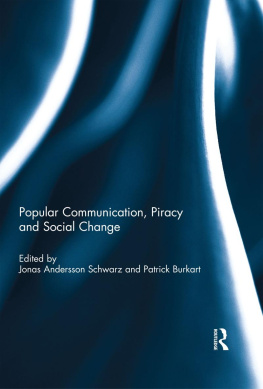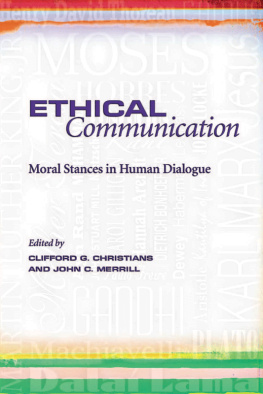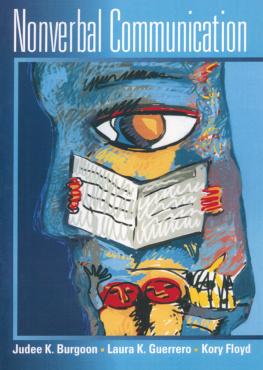First published in 1973 by Gordon and Breach, Science Publishers, Inc.
This edition first published in 2016
by Routledge
2 Park Square, Milton Park, Abingdon, Oxon OX14 4RN
and by Routledge
711 Third Avenue, New York, NY 10017
Routledge is an imprint of the Taylor & Francis Group, an informa business
1973 Lee Thayer for selection and editorial matter
All rights reserved. No part of this book may be reprinted or reproduced or utilised in any form or by any electronic, mechanical, or other means, now known or hereafter invented, including photocopying and recording, or in any information storage or retrieval system, without permission in writing from the publishers.
Trademark notice : Product or corporate names may be trademarks or registered trademarks, and are used only for identification and explanation without intent to infringe.
British Library Cataloguing in Publication Data
A catalogue record for this book is available from the British Library
ISBN: 978-1-138-93903-5 (Set)
ISBN: 978-1-315-67052-2 (Set) (ebk)
ISBN: 978-1-138-94496-1 (Volume 14) (hbk)
ISBN: 978-1-315-67042-3 (Volume 14) (ebk)
Publisher's Note
The publisher has gone to great lengths to ensure the quality of this reprint but points out that some imperfections in the original copies may be apparent.
Disclaimer
The publisher has made every effort to trace copyright holders and would welcome correspondence from those they have been unable to trace.
Copyright 1973 by
Gordon and Breach, Science Publishers, Inc.
One Park Avenue,
New York, N.Y. 10016
Editorial office for the United Kingdom
Gordon and Breach, Science Publishers Ltd.
42 William IV Street
London W.C.2.
Editorial office for France
Gordon & Breach
79 rue Emile Dubois
Paris 14 e
Library of Congress catalog card number applied for. ISBN 0 677 13360 X ( cloth ); 0 677 13365 0 ( paper ). All rights reserved. No part of this book may be reproduced or utilized in any form or by any means, electronic or mechanical, including photocopying, recording, or by any information storage or retrieval system, without permission in writing from the publishers. Printed in Great Britain.
On the Uses of Communication
THROUGHOUT human history, the misuses of language have frequently been singled out as the ultimate source not only of social disintegration, but of most human immorality as well. When asked by Tselu why he considered the establishment of a correct terminology as a ruler's foremost task, Confucius replied:
If the terminology is not correct, then the whole style of one's speech falls out of form; if one's speech is not in form, then orders cannot be carried out; if orders are not carried out, then the proper forms of worship and social intercourse... cannot be restored; if the proper forms of worship and social intercourse are not restored, then legal justice in the country will fail; when legal justice fails, then the people are at a loss to know what do do or what not to do. When a gentleman institutes something, he is sure by what terminology it should be called, and when he gives an order, he knows that the order can be carried out without question. A gentleman never uses his terminology indiscriminately.
Twenty-five centuries ago, Confucius equated the proper use of language and communication with proper habits of mind, and these with basic moral and social order. For Confucius, peace and order depended upon the proper use of language, not upon proscriptive law.
One finds many allusions to these consequences of the misuse of language in the Bible : the first, immorality, viz., "But let your communication be Yea, yea, Nay, nay: for whatsoever is more than these cometh of evil"; the second, social disintegration, viz., "... let us go down, and there confound their language, that they may not understand one another's speech." Bacon's Idols of the Market Place were those errors due to the influence of language: "... words still manifestly force the understanding, throw everything into confusion, and lead mankind into vain and innumerable controversies and fallacies." Roger Ascham said that "when apt and good words are neglected, then also begin ill deeds to spring."
Nor are freedom and enlightenment the ultimate correctives. In his Preface to the first French edition of The Illusions of Progress, Georges Sorel wrote:
Democracy is succeeding in throwing minds into a state of confusion, preventing many intelligent people from seeing things as they really are, because democracy is served by apologists who are clever in the art of beclouding questions. This is due to cunning language, smooth sophistry, and a great array of scientific declamations. It is above all of democratic times that it can be said that humanity is governed by the magical power of impressive words rather than by ideas, by slogans rather than by reason, and by dogmas whose origins no one thinks of looking into....
In the March 8, 1971, issue of Time magazine, Melvin Maddocks labelled a like such common disease of our time as "semantic aphasia,"
... that numbness of ear, mind and heartthat tone deafness to the very meaning of languagewhich results from the habitual and prolonged abuse of words... semantic aphasia is the monstrous insensitivity that allows generals to call war "pacification," union leaders to describe strikes or slowdowns as "job actions," and politicians to applaud even moderately progressive programs as "revolutions."
"All of us," Maddocks continues, "from the admen with their jingles to the tin-eared scholars with their jargonare victims as Well as victimizers of the language we have inherited."
In spite of the frequency and the eloquence of such warnings throughout all of human history, most men have taken their language for granted. If it faulted them, that fault was looked upon as a defect in the tool, not in its user. In his paper, "Languagethe Basis of Science, Philosophy, and Poetry," Leo Spitzer put it well:
The majority of men behave toward their language as our primitive ancestors did toward their wives: they gladly accepted their service, their ever-abiding presence, the atmosphere they gave to their lives, but scarcely thought or spoke about them unless they found them unfaithful....
Martin Buber has suggested that the source of all human conflict is that men do not say what they mean and they do not do what they say.
II
Little seems to have changed since ancient times. Everywhere, men seem to have the same kinds of "communication" problems they have always had. In the introduction to Gulistan in 1258 A.D., Sa'Bi wrote, "In the faculty of speech man excels the brute; but if thou utterest what is improper, the brute is they superior." That which distinguishes us as human endows us with a tragic flaw. Only man can name things; thus only man can misname things.










